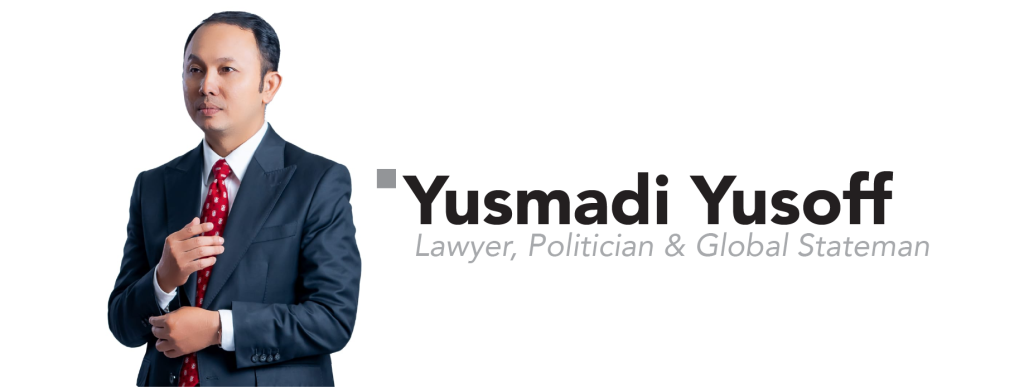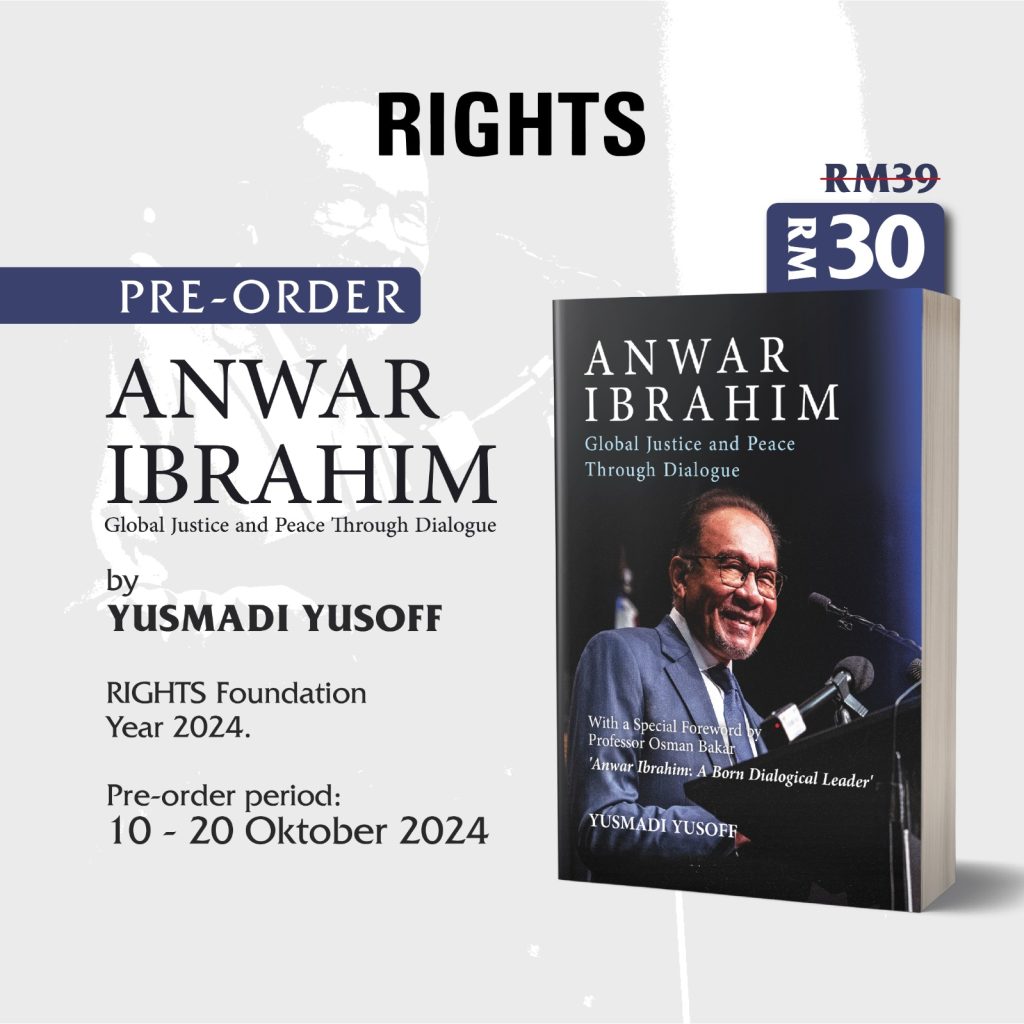
Pre-order Now: “Anwar Ibrahim: Global Justice and Peace Through Dialogue”
By Yusmadi Yusoff
RIGHTS Foundation. 2024. xxii + 150pp. Paperback.
“This book captures Anwar’s steadfast commitment to democratic liberties and human rights. Going beyond mere portrayals of the life of a prominent personality in contemporary world history, Yusmadi Yusoff imparts pragmatic insights for aspiring politicians, advocates, and catalysts of societal transformation. Riveting, enthralling, and motivating, this book is hard to put down once you start!” — Khairudin Aljunied
Finally, the latest work by Yusmadi Yusoff, published by RIGHTS Foundation, is here for readers!
This book delves into the role of Dato’ Seri Anwar Ibrahim in championing global justice and peace through dialogue. For the first time, this writing explores these themes in depth.
Don’t miss the opportunity to get it at a special price of only RM30!
Preorder period: 10 – 20 October 2024.
Preorder now at: pujanggabooks.onpay.my/order/form/anwaribrahim
#AnwarIbrahim #YusmadiYusoff #GlobalJustice #PeaceThroughDialogue #Preorder #RIGHTSFoundation #Malaysia #PMX #HumanRights #GlobalDialogue #PujanggaBooks

“Anwar Ibrahim: The Mandela of the East in the Fight Against Palestinian Apartheid”
By Yusmadi Yusoff
As the world grapples with the ongoing struggle for justice and peace in Palestine, one name stands out as a beacon of hope and resilience in Southeast Asia: Anwar Ibrahim, the 10th Prime Minister of Malaysia. Just as Nelson Mandela’s fight against apartheid in South Africa inspired a global movement, Anwar’s tireless efforts to end apartheid, genocide, and atrocities in Palestine have positioned him as “the Mandela of the East.”
The comparison is not made lightly. Nelson Mandela’s legacy is one of unparalleled courage, sacrifice, and a steadfast commitment to justice and equality. Similarly, Anwar Ibrahim’s journey has been marked by personal sacrifice, unwavering dedication to human rights, and a relentless pursuit of peace. Both leaders have endured imprisonment, persecution, and immense personal hardship in their quest to challenge systems of oppression and bring about transformative change.
Anwar’s advocacy for Palestine has been a cornerstone of his political career. He has consistently used his platform to highlight the plight of the Palestinian people, advocating for their rights and sovereignty on the global stage. His speeches at international forums, including the United Nations, have called for immediate action to address the humanitarian crisis in Palestine. Anwar’s diplomatic efforts have also been instrumental in rallying support from ASEAN member states, urging them to adopt a unified stance against Israeli aggression.
One of the most significant parallels between Anwar Ibrahim and Nelson Mandela lies in their ability to inspire and mobilize grassroots movements. Mandela’s fight against apartheid was bolstered by a global network of activists and supporters who amplified his message and put pressure on governments to act. Similarly, Anwar has engaged with local communities, grassroots organizations, and youth movements to build a strong base of support for the Palestinian cause. His efforts have led to numerous fundraising campaigns, medical aid missions, and educational initiatives that provide tangible support to Palestinian refugees and victims of conflict.
Anwar’s commitment to peace and dialogue is another striking similarity to Mandela’s legacy. Mandela’s approach to reconciliation and nation-building was rooted in dialogue, understanding, and a commitment to non-violence. Anwar, too, has prioritized peacebuilding through dialogue, facilitating interfaith conversations and fostering understanding between Muslim, Christian, and Jewish communities. His efforts to promote peaceful coexistence and mutual respect are vital in the context of the Israeli-Palestinian conflict, where deep-seated mistrust and animosity often hinder progress towards peace.
The international community must recognise Anwar Ibrahim’s contributions to peace and justice in Palestine. His nomination for the Nobel Peace Prize 2025 would not only honour his efforts but also draw much-needed attention to the ongoing struggle for Palestinian rights. By branding him as “the Mandela of the East,” we acknowledge the profound impact of his work and the inspiration he provides to countless individuals fighting for justice worldwide.
Nelson Mandela once said, “It always seems impossible until it’s done.” These words resonate deeply with Anwar Ibrahim’s journey and his unwavering belief in the possibility of a just and peaceful world. As we continue to strive for peace in Palestine, let us draw inspiration from Anwar’s example and support his efforts to bring about meaningful change. By doing so, we honour the legacy of Mandela and uphold the values of justice, equality, and human dignity that he championed.
In recognising Anwar Ibrahim as “the Mandela of the East,” we celebrate a leader whose life and work embody the spirit of resilience, compassion, and a relentless pursuit of justice. It is a testament to the enduring power of one individual’s commitment to make a difference and a call to action for all of us to support the cause of peace and justice in Palestine.
Yusmadi Yusoff is a lawyer, former Senator and Member of Parliament for Balik Pulau. He is the Founder and Chairman of the RIGHTS Foundation, an independent think tank and charity organization focusing on governance, human rights, and social justice initiatives in the region.
REDIFINING DEVELOPMENT THROUGH RUBANISATION: Manifesting the MADANI Vision **
Navigating a New Era of Development in Malaysia
In the midst of globalization and the dynamic changes of the 21st century, Malaysia finds itself at a pivotal crossroads in its development narrative. Rich in cultural diversity and varied landscapes, the country now faces the challenge of integrating urban sophistication with rural tranquility. This is where Rubanisation, an innovative concept that fuses these two elements, emerges as a potentially transformative development strategy for Malaysia.
Rubanisation transcends traditional infrastructure development, offering a deeper redefinition of prosperity and quality of life. By merging the vitality and innovation of urban areas with the serenity and sustainability of rural life, Rubanisation addresses the development dilemma that often neglects one aspect in favor of the other.
The Genesis of Rubanisation
The concept of Rubanisation, birthed from the insightful minds of visionary thinkers like Architect Philosopher Professor Tay Kheng Soon, is a response to the evolving challenges and opportunities in contemporary development. It emerges from a critical examination of how modern societies grow, often polarized between urban advancement and rural stagnation. Rubanisation challenges this dichotomy, advocating for a more integrated and synergistic approach. It seeks a harmonious balance where the vibrancy and innovation of urban life complement the tranquility and sustainability of rural communities.
In Malaysia, a country characterized by a rich mosaic of cultural landscapes and economic disparities, Rubanisation is not just relevant but necessary. The nation’s development trajectory has traditionally mirrored global trends, where urban areas often outpace rural regions in terms of infrastructure, investment, and opportunities. Rubanisation, in this context, offers a transformative solution. It proposes a model where rural areas are not merely beneficiaries of urban overflow but equal partners in national progress. This approach envisions a future where technological advancements and infrastructural developments are as much a part of the rural fabric as they are in urban centres.
Rubanisation is more than just a theoretical construct; it’s a practical blueprint for equitable development. It calls for policies and strategies that bridge urban-rural gaps, foster economic inclusivity, and promote environmental stewardship. In Malaysia, this means rethinking rural development, not as a separate agenda but as an integral part of national growth. It involves reimagining how resources are allocated, how technology is disseminated, and how communities are empowered. This paradigm shift is pivotal for Malaysia as it strives to achieve a more balanced, sustainable, and inclusive growth, reflective of its diverse heritage and ambitious future aspirations.
FELDA Can Be A Prime Example of Rubanisation in Action
In Malaysia’s development narrative, FELDA (Federal Land Development Authority) stands as a prime example of where Rubanisation can be instrumental. As a pioneer in rural development and poverty eradication, FELDA is ideally positioned to embrace Rubanisation. This approach can transform FELDA settlements into vibrant communities that enjoy the benefits of urbanization while retaining their rural essence. Here, Rubanisation might involve introducing innovative agricultural practices, enhancing digital connectivity, and improving infrastructure, all while preserving the cultural and environmental uniqueness of the settlements.
Strategic Housing: The Heart of Inclusive Growth
Strategic housing within the framework of Rubanisation is crucial, particularly for FELDA settlements. It’s about creating inclusive communities with access to safe, affordable, and dignified living spaces. This initiative is key to raising living standards and fostering social equity, ensuring that the benefits of development are accessible to all.
Rubanisation and the MADANI Vision
The principles of Rubanisation align with Prime Minister Dato’ Seri Anwar Ibrahim’s MADANI vision, which emphasizes sustainability, compassion, innovation, and prosperity. Implementing Rubanisation in FELDA settlements acts as a tangible manifestation of the MADANI vision, creating a model for inclusive development that fosters a caring, innovative society.
Economic and Social Implications of Rubanisation in FELDA
Adopting Rubanisation in FELDA settlements could significantly enhance local economies, creating new employment and income opportunities. Socially, it cultivates community spirit and ensures that no part of Malaysia is left behind in the country’s progress. This approach also supports environmental sustainability and cultural preservation, integral aspects of a balanced development model.
Challenges and Opportunities in Implementing Rubanisation
Implementing Rubanisation, especially in established entities like FELDA, presents challenges, including resource allocation, planning, and collaboration. However, these challenges also create opportunities for innovation, public-private partnerships, and community involvement, leading to sustainable development outcomes.
Rubanisation as a Global Development Model
Malaysia’s successful implementation of Rubanisation, exemplified through FELDA, can inspire other nations facing similar urban-rural divides. It offers lessons in harmonizing modernization with sustainability, economic growth with social equity, and technological advancement with cultural integrity.
Charting a Progressive and Inclusive Future for Malaysia
Rubanisation embodies a commitment to a future where every Malaysian, irrespective of their geographical or socio-economic background, can lead a fulfilling and prosperous life. Exemplified by initiatives like those in FELDA, this approach marks a significant shift in the national development paradigm, moving beyond conventional metrics of economic growth to embrace a more holistic measure of progress.
This approach, aligned with the MADANI vision, offers a nuanced understanding of development, recognizing that true progress is about creating a society where every individual has access to opportunities, where communities are interconnected, and where the environment is preserved for future generations. Rubanisation, therefore, represents a pathway to a more equitable, sustainable, and resilient Malaysia, setting a global precedent for balanced growth in an interconnected world.
** Yusmadi Yusoff, a lawyer, former Member of Parliament (Senator, Dewan Negara and Ahli Dewan Rakyat for Balik Pulau) and newly appointed Chairman of Encorp Berhad
Leave a Reply